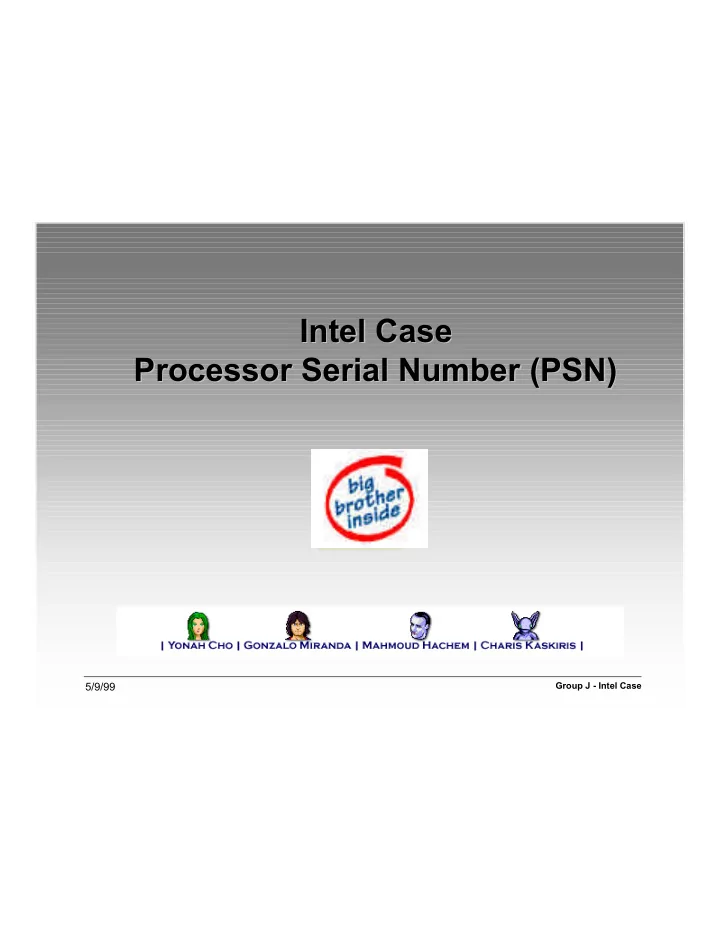

Intel Case Intel Case Processor Serial Number (PSN) Processor Serial Number (PSN) 5/9/99 Group J - Intel Case
Issue Issue Intel recently issued a new CPU (Pentium III) with a unique ID number that could be used for intellectual property protection, marketing, etc. The ID number can be configured to be visible or invisible to applications, including Web browsers. Question 1: Should the chip be shipped with the ID number visible as the default? Question 2: Should the ID number exist at all? 5/9/99 Group J - Intel Case
Outline Outline • Introduction – What is PSN ? – Who will identify what & whom ? • Controversies • Privacy • Security • Inconvenience • Overall Implications to Users – Network effect ahead – Who benefits from the PSN feature? 5/9/99 Group J - Intel Case
Introduction Introduction • Embedded 96-bit code during chip fabrication – 32-bit:information about processor type – 64-bit: unique to each processor • Not modifiable or erasable • Configurable to be “on” or “off” – Intel’s PSN Control Utility (application level) – System BIOS • Readable by networks & applications 5/9/99 Group J - Intel Case
Related Issues Related Issues • Security – Lack of user control: soft-switchable feature – No way of verifying true ID • Inconvenience – A new computer means a new number computer upgrade, exchanges, etc... • Privacy – No legal protection for Internet privacy – “permanent cookie" 5/9/99 Group J - Intel Case
Lack of User Control Lack of User Control • C’T Magazine reports – Able to bypass Pentium III security mechanism & turn on the PSN without the user rebooting his/her system (Intel confirmed) • Zero-Knowledge Systems – Able to turn on the PSN without owner’s knowledge 5/9/99 Group J - Intel Case
Expert Opinion Expert Opinion “The software that queries the processor is not trusted. If a remote Web site queries a processor ID, it has no way of knowing whether the number it gets back is a real ID or a forged ID. Likewise, if a piece of software queries its processor’s ID, it has no way of knowing whether the number it gets back is the real ID or whether a patch in the operating system trapped the call and responded with a fake ID”. Bruce Schneier Crytographer 5/9/99 Group J - Intel Case
Security Security Reality Intel’s claim • PSN can only identify a • PSN can be used to specific machine, not a identify an individual specific person. engaging in e- commerce. • Anyone with an account at an online merchant could access that account from home, from the office, or from a friend's home. 5/9/99 Group J - Intel Case
User Inconvenience User Inconvenience • A new computer means a new identity • What about processor update? • Multiple computer users • Computer sharing 5/9/99 Group J - Intel Case
Threats to Privacy Threats to Privacy • No clear laws for privacy protection – consumers are vulnerable • Asymmetric distribution of information – Advantages to direct marketers, data-mining companies, other e-commerce companies by tracking the path of Web surfers more easily – Information could be stored in databases, uniquely identified by PSN – Databases could be shared between companies or sold to other companies 5/9/99 Group J - Intel Case
Network Effect Network Effect • Intel can leverage their dominance to set the PSN as a de Facto Standard Global User Identification • Wide adoption by companies in unfair information practices & software developers • Limited choices for consumers – No access to web-sites/chat rooms without PSN – Participate in e-commerce with privacy at risk 5/9/99 Group J - Intel Case
Opposition Opposition • Boycott of Pentium III – Electronic Privacy Information Center – Junkbusters Corporation – Privacy International • A complaint filed to FTC • Numerous on-line protests against the use of PSN 5/9/99 Group J - Intel Case
Overall Implications to Users Overall Implications to Users • Benefits electronic marketing forces at the expense of user’s privacy • Users are the victims of differential pricing • Adds inconvenience for users in cases of computer sharing, hardware upgrades, etc... • Does not prevent chip theft or over-clocking • De Facto standard forces software companies and e- commerce sites to adopt the PSN feature 5/9/99 Group J - Intel Case
The End The End 5/9/99 Group J - Intel Case
Wrap-up Slide Wrap-up Slide Question 1 : Should the chip be shipped with the ID number visible as the default? Argument Used in Favor: It will increase net security. Fact: It has been demonstrated that the ID number is “hackable” and thus, insecure by definition. Conclusion: Chip should be shipped with the ID number in the “off” position. 5/9/99 Group J - Intel Case
Wrap-up Slide Wrap-up Slide Question 2 : Should the ID number exist at all? Argument Used in Favor: It will increase net security. Fact: Privacy is a core American value . Security should NOT be implemented at the expense of user’s privacy. Conclusion: PSN should NOT exist at all. 5/9/99 Group J - Intel Case
Thank you Thank you for your attention for your attention 5/9/99 Group J - Intel Case
On the Internet... On the Internet... 5/9/99 Group J - Intel Case
Recommend
More recommend